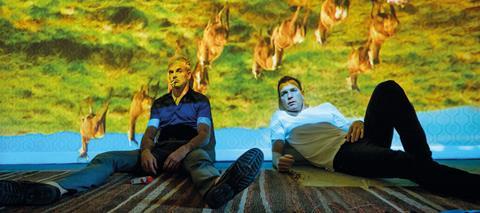Dir. Danny Boyle. UK. 2016. 117 mins.

It’s impossible to approach this sequel, which rejoins the Trainspotting characters twenty years later, without remembering Sick Boy’s Unifying Theory of Life from the original film. “At one point, you’ve got it,” he mused. “Then you lose it. Then it’s gone forever.” While Boyle and his team have clearly still ‘got it’, the characters have reached a point in life when, to quote Mark ‘Rentboy’ Renton (Ewan McGregor), they must accept “reconciliation with what you can get rather than what you had hoped for”. The tonal shift in the sequel compared to the original means that, although there are plenty of moments of savage humour, the highs are just not quite so high any more. There’s a melancholy maturity, however, which is satisfying in its own way.
This is a sequel which is unusually closely tied to the original film.
The ache of regret which underpins this portrait of men still struggling with growing up is unlikely to harm the film’s box office prospects. Such is the iconic status of Trainspotting that this sequel is like the reunion tour of a much-loved band. Sure the key members have lost a bit of hair, and they play a few more sad songs, but the nostalgic thrill of seeing them together again is so potent, it almost doesn’t matter if they no longer harmonise quite as well as they used to.
T2 Trainspotting’s commercial prospects are healthiest in the UK, where the cultural impact of Trainspotting still resonates most strongly. Elsewhere, the slick package - DoP Anthony Dod Mantle and production designer Mark Tildesley bring a dirty, sexy, colour-saturated energy to the picture - and the name appeal of McGregor and Boyle will add to the picture’s drawing power.
The plot sees Renton returning to Edinburgh to face up to two of the three friends he robbed at the end of the last film. Spud (Ewen Bremner) hasn’t managed to shake his habit. A scene in which he scores heroin from a pair of sneering dealers less than half his age is one of the most quietly devastating of the film. Meanwhile Sick Boy (Jonny Lee Miller), or Simon as he is now known, is running a failing pub, with a sideline in blackmail.
Begbie (Robert Carlyle) is still safely behind bars, or so Renton believes. An additional character, Simon’s girlfriend and business partner Veronica (Anjela Nedyalkova), is too underdeveloped to merit the crucial role she plays in the third act.
The writing, by returning screenwriter John Hodge, retains the satirical bite of the original film, and the neat use of ironic metaphor. Renton, for example, is introduced pounding on a treadmill, before slipping and unceremoniously sprawling in a heap on the floor. The middle-aged male condition is evoked with brutal efficiency. It’s a screenplay which nimbly juggles seemingly contradictory elements. It manages to mock nostalgia, whilst also embracing it – after all, it’s unlikely this sequel would exist were it not for the misty affection of a whole generation who grew up with the first movie.
This is a sequel which is unusually closely tied to the original film. This manifests itself in several ways. The most overt, and jarring, of these is the decision to cut in clips from the first Trainspotting. While the two pictures have much in common, tonally they are different beasts. Each glimpse of Renton, Sickboy, Spud and Begbie in the past is a reminder of how much more fun they were twenty years ago.
More successful are the wry nods and playful references. This works particularly well with the music. The soundtrack of Trainspotting became iconic in its own right, a standalone entity. Even the faintest hint of Lou Reed’s Perfect Day or Underworld’s Born Slippy is enough to bring back a rush of good will. In the most audacious moment, Renton revisits his childhood bedroom for the first time after his twenty-year exile. He pulls a record from its sleeve and drops the needle onto it, then lifts it almost immediately. But the briefest snatch of music is clearly recognisable as Iggy Pop’s Lust For Life – a tease and an in-joke for fans.
Like the first film, T2 is structured episodically, like a string of slightly disjointed stoner anecdotes. What’s new here is an elegant device which brings Spud to the front and centre of the film. In an effort to finally quit heroin, he follows Renton’s advice and tries to replace one addiction with another: writing. Gradually, it’s Spud’s voice that takes control of the story, and with it comes a note of hope for the most sympathetic but pitiable of all the reprobates who burst out of Irvine Welsh’s pages.
Production companies: Cloud Eight Films, DNA Films, Decibel Films, TriStar Pictures
International sales: Sony Pictures Entertainment
Producer: Bernard Bellew, Danny Boyle, Christian Colson, Andrew Macdonald
Screenplay John Hodge
Cinematography: Anthony Dod Mantle
Editor: Jon Harris
Production design: Mark Tildesley
Main cast: Ewan McGregor, Robert Carlyle, Jonny Lee Miller, Kelly Macdonald, Shirley Henderson, Ewen Bremner, Irvine Welsh, Anjela Nedyalkova, Simon Weir























